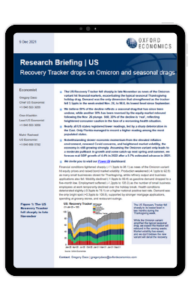US Recovery Tracker drops on Omicron and seasonal drags

The US Recovery Tracker fell sharply in late November as news of the Omicron variant hit financial markets, exacerbating the typical seasonal Thanksgiving holiday drag. Demand was the only dimension that strengthened as the tracker fell 3.1ppts in the week ended Nov. 26, to 96.6, its lowest level since September.
We believe 50% of the decline reflects a seasonal drag that has since been undone, while another 30% has been reversed by the equity market rebound following the Nov. 26 plunge.
What you will learn:
- Nearly all US states registered lower readings, led by a sharp deterioration in the East.
- Notwithstanding slower economic momentum from the elevated inflation environment, renewed Covid concerns, and heightened market volatility, the economy is still growing strongly.
- Assuming the Omicron variant only leads to a moderate pullback in growth and some catch-up next spring and summer, we foresee real GDP growth of 4.4% in 2022 after a 5.7% estimated advance in 2021.
Tags:
Related Services

Post
UK: Supply constraints are probably less prominent in the south
The extent to which UK employers can respond to likely 2024 interest rate cuts with increased output, rather than rises in prices and wages, will partly reflect the extent of spare capacity. This will inevitably vary by region. Evidence on this is imperfect, but in terms of capital assets (including intangibles) and labour availability, southern regions appear to be in a stronger position than those in the UK's traditional industrial heartland.
Find Out More
Post
Global Private equity real estate fund maturities spur asset sales
We expect the significant increases in fund maturities, spurred by capital raised over the past decade, to exert upward pressure on the rate of asset disposals as the funds approach the end of their lifecycles.
Find Out More